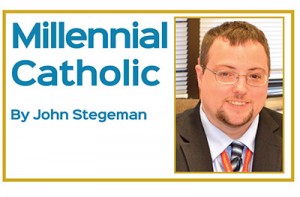Faith in the age of internet comments
 Anyone who sets sail on the digital sea eventually faces the internet’s most contentious waters — the comment section.
Anyone who sets sail on the digital sea eventually faces the internet’s most contentious waters — the comment section.
Should one dare keep scrolling past the end of a post for fear of what they might find? Or is it better to read on and see if some further insight might be gained?
The temptation to look away is high. There’s little need to cite statistics concerning the malevolent and offensive comments that populate user response sections on virtually every website that allows an open forum. Pick any site you like and, perhaps after a prayer, take a look. It usually isn’t pretty.
Still, God raises up saints in every age and every situation — even in the online comment section.
Internet comments began in as we know them now as “guest books” in the 1990s, which grew out of a similar bulletin board systems from the late 70s. While comment sections can be a problem for all web sites, they are most commonly used on news websites and blogs.
What started as a place where readers could engage in discussion about the news of the day, and even communicate with the reporters who wrote the news, has become a place where basic human decency is often left at the digital door.
By the late 1990s, comments on newspaper websites had developed their vicious culture with avatars and user names allowing people to hide their true identity. In more recent years, systems like Facebook and others that require an ostensibly real name, hasn’t done much to improve things. The disturbing “comment culture” that often dominates these sections caused Popular Science to end its comment section in 2013. CNN suspended comments on certain articles during the Fergusson, Missouri protests and the same year Reuters dropped comments on everything except opinion stories.
On one hand, it is hard to blame them.
Late last month I was scrolling through Facebook and saw a tragic post. A Cincinnati TV station reported the murder of a woman at the hands of her husband. The article had the requisite details and I noticed a high number of comments, despite the post being relatively new. I will not quote them here, but the insults levied at the victim of the crime made me feel truly ill.
I wanted to comment, but didn’t know what to say. I moved on, still feeling uneasy about what I read.
Now I’m not naive. I’ve been in my share of “flame wars” (noun: an argument between Internet users who repeatedly provoke each other with personal attacks through e-mail and other forms of online communication). But for some reason this time the comments got to me. The worst was a man — mid 30s or 40s, smiling and holding a young child in his profile picture — profanely insulting the deceased victim of violence.
Though I didn’t comment, a friend did. She posted that the turn of events was sad, and they she’d be praying for the family. She wasn’t alone. Others noted the sadness and expressed concern. Hers was the only one I saw that day declaring an intent to pray.
For this, she was attacked. Various commenters jumped on her post with personal insults and arguments, and all she was trying to do was express her solidarity with people in a tragic situation, and offer prayers to God. The comments eventually became threatening, and for safety she deleted the post.
It seems fair to say that most comment sections are essentially barbaric wastelands, but are they all bad? Secular and Catholic sites are still trying to work out the answer.
Some national Catholic websites, like the National Catholic Register, allow comments. Others, such as Crux, do not. On the diocesan level, a handful of newspapers, like Green Bay’s The Compass, allow moderated comments, whereas this newspaper, TheCatholicTelegraph.com, does not.
For the user experience, I reached out on social media asking for stories where the comment section managed to be a ray of hope, or at least something other than a terrible disappointment.
I waited two weeks, an eternity in social media time, and not one person responded with such an anecdote.
Of course that doesn’t mean no one has ever left a nice comment, but it doesn’t help the argument, made by some, that comment sections are best ignored.
As a Catholic who specializes in new media, I don’t think sticking our heads in the sand is the answer.
Pope Emeritus Benedict XVI’s message for World Communications Day in 2011 included this gem.
“I would like then to invite Christians, confidently and with an informed and responsible creativity, to join the network of relationships which the digital era has made possible. This is not simply to satisfy the desire to be present, but because this network is an integral part of human life. The web is contributing to the development of new and more complex intellectual and spiritual horizons, new forms of shared awareness. In this field too we are called to proclaim our faith that Christ is God, the Saviour of humanity and of history, the one in whom all things find their fulfilment (cf. Eph 1:10).”
The Pope Emeritus thinks light years above my capacity, but if I’m understanding him, we need to be there in these sections of the internet where no one is proclaiming that Christ is the savior. We need to be the light in the darkness.
How do we do this? That’ll be different for each person according to the gifts God has given us.
Maybe you’re the kind of person with enough inner calm to leave a positive comment on a contentious post without engaging in the negativity that follows. Maybe you’re a person who can, in all charity and with properly educated perspectives, engage in kind debate with those posting offensive things. Maybe you just pray for peace in the world, not only as it pertains to violence and suffering in the public sphere, but in the hearts of those that spew distasteful comments online.
God raises up saints in every age. The patron saint of the internet is St. Isidore of Seville, who tried to record an anthology of all knowledge back in the 600s. There’s no patron saint of the internet comment section yet, but even in that dark part of the web where it seems very little positive is said, I believe God will raise up saints as well.
Author’s Note: On the topic of bringing a Christian presence to social discourse, let me mention Civilize It. This outreach of the Archdiocese of Cincinnati is urging everyone to keep a respectful dialogue this election season, both online and off. Check out Civilize It HERE.
Have an idea for a Millennial Catholic column topic? Email John Stegeman.
Previous Millennial Catholic columns
Why aren’t more Millennials in the pew? Let’s ask
Millennials at Mass: To whom shall we go?
“Bad” Catholic school experience helped student become better man













